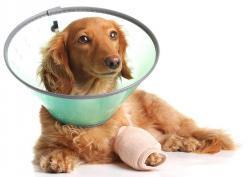Pet ACL Surgery

Understanding Cat and Dog ACL Surgery
Anatomy of a Dog or Cat ACL Injury
If your pet limps, appears wobbly when walking, or avoids his usual weight-bearing activities, he may have a torn anterior cruciate ligament (ACL). This ligament is necessary for knee joint stability; without it, walking may only become more painful or even impossible as osteoarthritis sets in. Fortunately, our skilled team serving Westchester and Scarsdale can surgically repair an ACL injury to restore stability to the joint and help your pet get moving again.
 The knee is a more complex joint than many people realize. Its range of motion is controlled, not by the leg bones, but by the ligaments that hold them together. The ACL extends at an angle from the tibia to the femur, preventing bone-on-bone friction and prohibiting excess movement within the knee joint. In a typical dog or cat ACL injury, this ligament is either partially or completely torn. A torn ACL is a painful condition that can cause an animal to limp or even fall over. The damage to the knee only gets worse if left untended.
The knee is a more complex joint than many people realize. Its range of motion is controlled, not by the leg bones, but by the ligaments that hold them together. The ACL extends at an angle from the tibia to the femur, preventing bone-on-bone friction and prohibiting excess movement within the knee joint. In a typical dog or cat ACL injury, this ligament is either partially or completely torn. A torn ACL is a painful condition that can cause an animal to limp or even fall over. The damage to the knee only gets worse if left untended.
How Our Westchester Veterinarian Can Help
Our experienced team at Central Animal Hospital, led by Westchester veterinarian Dr. Michael Woltz, can diagnose a torn ACL and provide the appropriate treatment. A mild tear may heal with extended rest, but more serious problems usually indicate the need for ACL surgery. For an ACL injury in a small-breed dog or cat, we may use suture material to construct an artificial ACL. Larger, heavier pets may require a more extensive procedure in order to reshape the tibia to reduce stress and improve joint stability without a functioning ACL. There are two variations on this theme, a Tibial Plateau Leveling osteotomy, or TPLO, and a Tibial Tuberosity Advancement, or TTA. We can advise you on the best option for your pet’s needs.
The sooner you get your companion’s knee issue diagnosed, the more effectively it can be treated. Contact our office today!
Does your pet appear to have a lingering knee injury? What happened?
